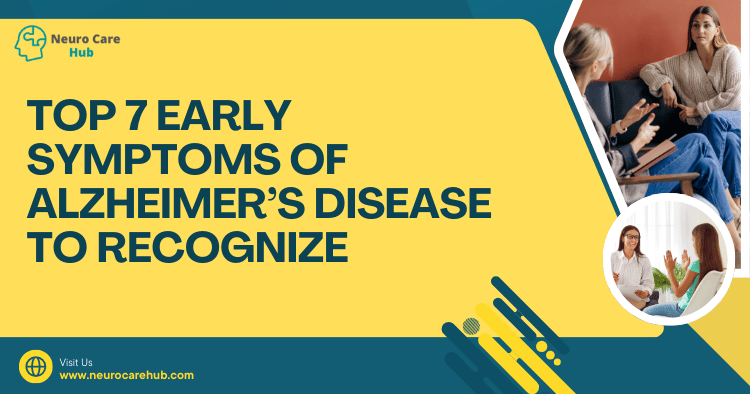Table of Contents
- Introduction
- 1. Memory Loss
- 2. Difficulty in Planning or Solving Problems
- 3. Confusion with Time or Place
- 4. Trouble Understanding Visual Images and Spatial Relationships
- 5. New Problems with Words in Speaking or Writing
- 6. Misplacing Things
- 7. Withdrawal from Work or Social Activities
- Conclusion
- FAQs
Introduction
Alzheimer’s disease is a progressive neurological disorder that affects millions of people worldwide. Understanding the early symptoms is crucial for early intervention and management. In 2024, advancements in neuro care and increased awareness have highlighted the significance of recognizing these symptoms early, allowing for timely support and treatment. This article will explore the top seven early symptoms to recognize, empowering you to take action if you or a loved one experiences these signs. Let’s dive in!
1. Memory Loss
One of the most recognizable early signs of Alzheimer’s is memory loss, particularly regarding newly learned information. Individuals may frequently forget recent conversations or events and rely heavily on memory aids.
Why It Happens
Alzheimer’s affects the brain regions responsible for memory, leading to difficulties in forming new memories, while older memories may remain intact longer.
How to Recognize It
- Frequently losing track of recent conversations or events.
- Forgetting important dates or events and needing reminders.
- Relying increasingly on memory aids or family members for information.
For more insights on the importance of early intervention, check out Top 5 Benefits of Early Intervention in Neuro Care.
2. Difficulty in Planning or Solving Problems
Individuals may experience trouble with planning, reasoning, or handling numbers, such as following a recipe or managing monthly bills. This characteristic can be subtle but noticeable over time.
Why It Happens
Cognitive functions like problem-solving and reasoning decline as the disease progresses, making it challenging to keep track of steps in tasks.
How to Recognize It
- Difficulty following a familiar recipe or planning a trip.
- Struggling to manage bills or grocery lists.
- Losing track of the steps needed to complete a task.
“Recognizing these changes early can lead to proactive steps in management and support.”
3. Confusion with Time or Place
Another early symptom is confusion regarding dates, seasons, and the passage of time. Individuals may forget where they are or how they got there.
Why It Happens
Alzheimer’s impacts the brain’s ability to process time and recognize familiar environments, leading to disorientation.
How to Recognize It
- Losing track of the seasons or the passage of time.
- Confusion about where they are or how they arrived there.
- Difficulty understanding scheduled appointments or events.
“Awareness and understanding of these symptoms can facilitate a supportive environment for those affected.”
4. Trouble Understanding Visual Images and Spatial Relationships
This symptom often manifests as difficulty reading, judging distances, and determining color or contrast, which can lead to complications in driving or other activities that require visual-spatial awareness.
Why It Happens
Changes in the brain affect the visual processing areas, making it challenging to interpret visual information accurately.
How to Recognize It
- Difficulty with reading or judging distances while driving.
- Problems identifying colors or contrasts.
- Avoiding visual tasks that were once easy.
For more about how neuro care differs from mental health care, see Neuro Care vs. Mental Health Care: Key Differences Explained.
5. New Problems with Words in Speaking or Writing
Individuals may experience frequent struggles with vocabulary, including difficulty following or joining conversations. They might stop mid-sentence, unable to find the right word.
Why It Happens
Alzheimer’s interferes with the areas of the brain responsible for language, leading to communication challenges.
How to Recognize It
- Difficulty following or joining conversations.
- Repeating themselves or struggling to find the right words.
- Using unusual words or phrases that don’t make sense.
“Effective communication strategies can significantly improve interactions with individuals experiencing these challenges.”
6. Misplacing Things
A common sign is misplacing items and being unable to retrace steps to find them. Individuals may accuse others of stealing items, causing frustration.
Why It Happens
As the disease progresses, the ability to recall where items were placed diminishes, contributing to the feeling of losing control.
How to Recognize It
- Frequently losing items in odd places (e.g., putting keys in the refrigerator).
- Inability to retrace steps to find lost items.
- Accusing others of taking misplaced belongings.
Enhancing neuro care effectiveness is essential. Check out Top 5 Ways Caregivers Enhance Neuro Care Effectiveness.
7. Withdrawal from Work or Social Activities
As the disease progresses, individuals may begin to withdraw from hobbies, social gatherings, and work engagements that they once enjoyed.
Why It Happens
Feelings of confusion, frustration, or embarrassment can lead to social withdrawal as individuals cope with their symptoms.
How to Recognize It
- Avoiding social activities or events.
- Losing interest in hobbies or pastimes.
- Preferring to stay at home rather than engage with others.
“Social support plays a vital role in maintaining quality of life for those affected by Alzheimer’s.”
Conclusion
Recognizing the early symptoms of Alzheimer’s disease is vital for timely intervention and support. If you or someone you know is experiencing these symptoms, consider discussing them with a healthcare professional. Early diagnosis can lead to better management options and improved quality of life.
For additional resources and insights on neuro care, visit Neuro Care: A Guide to Brain Health.
FAQs
Q: What should I do if I notice these symptoms in myself or a loved one?
A: It’s essential to consult with a healthcare professional for an evaluation. Early diagnosis can help in managing symptoms more effectively.
“Taking action early can make a significant difference in care and support.”
Q: Are these symptoms definitive indicators of Alzheimer’s disease?
A: Not necessarily. Many of these symptoms can also be caused by other health issues. A professional evaluation is crucial for an accurate diagnosis.
Q: Can lifestyle changes help reduce the risk of developing Alzheimer’s?
A: Yes! Regular physical activity, a healthy diet, mental stimulation, and social engagement are believed to support brain health.
Q: Is Alzheimer’s disease hereditary?
A: While genetics can play a role, not everyone with a family history will develop the disease. Environmental and lifestyle factors also contribute.
“If you have more questions or concerns, feel free to reach out to a healthcare professional or explore resources from reputable organizations.”
Together, we can raise awareness and support those affected by Alzheimer’s disease!






